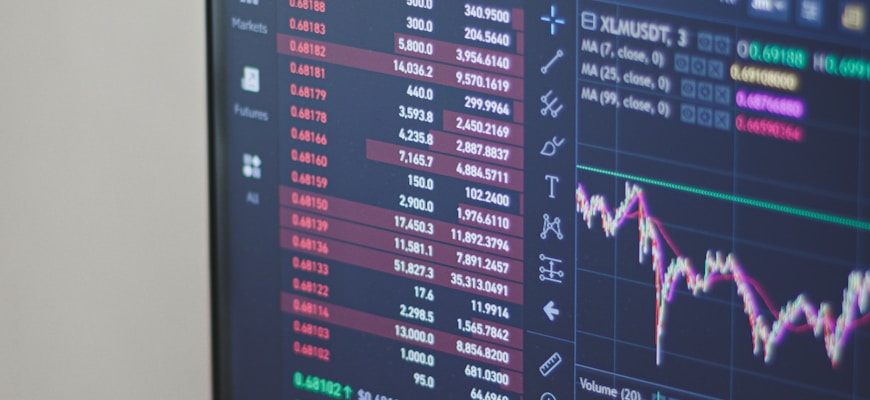How to Use Decentralized Exchanges for Optimal Trading

- Understanding the Basics of Decentralized Exchanges
- Benefits of Using Decentralized Exchanges for Trading
- Key Features of Decentralized Exchanges
- Tips for Safely Trading on Decentralized Exchanges
- Comparing Decentralized Exchanges to Centralized Exchanges
- Exploring the Future of Decentralized Exchanges
Understanding the Basics of Decentralized Exchanges
Decentralized exchanges (DEX) are platforms that allow users to trade cryptocurrencies directly with one another without the need for a central authority to facilitate the transactions. Understanding the basics of decentralized exchanges is essential for anyone looking to engage in optimal trading in the cryptocurrency market.
One key feature of decentralized exchanges is that they do not hold users’ funds. Instead, trades are conducted directly between users through smart contracts on the blockchain. This means that users retain control of their funds at all times, reducing the risk of hacks or theft that can occur on centralized exchanges.
Another important aspect of decentralized exchanges is the level of privacy they offer. Since users do not need to create accounts or provide personal information to trade on DEX platforms, their identities are kept anonymous. This can be appealing to those who value their privacy and want to keep their trading activities confidential.
Decentralized exchanges also promote transparency in the trading process. Because all transactions are recorded on the blockchain and can be verified by anyone, there is a higher level of trust in the system. This transparency helps to prevent market manipulation and ensures that trades are executed fairly.
Overall, understanding how decentralized exchanges work and the benefits they offer can help traders make more informed decisions and maximize their profits in the cryptocurrency market. By leveraging the features of DEX platforms, users can enjoy greater security, privacy, and transparency in their trading activities.
Benefits of Using Decentralized Exchanges for Trading
Decentralized exchanges offer numerous benefits for traders looking to optimize their trading experience. One key advantage is the increased security that comes with using decentralized platforms. By removing the need for a central authority to hold funds, decentralized exchanges reduce the risk of hacking and theft.
Another benefit of decentralized exchanges is the greater privacy they offer. With no need to provide personal information or undergo identity verification, traders can enjoy a higher level of anonymity when conducting transactions. This can be particularly appealing to those who value their privacy.
Decentralized exchanges also provide users with more control over their funds. By allowing traders to hold their own private keys, decentralized platforms eliminate the risk of funds being frozen or seized by a central authority. This gives traders peace of mind knowing that they have full control over their assets.
Furthermore, decentralized exchanges often offer lower fees compared to centralized exchanges. With no intermediaries involved, traders can save money on transaction costs and other fees. This can result in significant savings for active traders who conduct frequent transactions.
In addition to these benefits, decentralized exchanges are also known for their transparency. By using blockchain technology, all transactions on decentralized platforms are recorded on a public ledger, providing users with a high level of transparency. This can help build trust among traders and ensure the integrity of the trading process.
Key Features of Decentralized Exchanges
One of the key features of decentralized exchanges is the enhanced security they provide to traders. Unlike centralized exchanges, decentralized exchanges do not hold users’ funds, reducing the risk of hacks and theft. This increased security gives traders peace of mind when engaging in transactions on the platform.
Another important feature of decentralized exchanges is the absence of a central authority controlling the trading process. This decentralization ensures that all trades are conducted peer-to-peer, without the need for intermediaries. This not only promotes transparency but also eliminates the risk of manipulation by a central entity.
Decentralized exchanges also offer a wide range of trading pairs, allowing users to trade various cryptocurrencies directly with one another. This provides traders with more flexibility and opportunities to diversify their portfolios. Additionally, decentralized exchanges often have lower trading fees compared to centralized exchanges, making them a cost-effective option for traders.
Furthermore, decentralized exchanges are accessible to anyone with an internet connection, without the need for users to undergo lengthy verification processes. This inclusivity allows traders from around the world to participate in the exchange, fostering a global trading community. Additionally, decentralized exchanges are resistant to censorship, ensuring that users can trade freely without restrictions.
In conclusion, decentralized exchanges offer a secure, transparent, and cost-effective platform for traders to engage in peer-to-peer transactions. With a wide range of trading pairs and global accessibility, decentralized exchanges provide a convenient and efficient way for users to trade cryptocurrencies.
Tips for Safely Trading on Decentralized Exchanges
When it comes to trading on decentralized exchanges, it is essential to prioritize safety and security. Here are some tips to help you trade safely on decentralized exchanges:
- Only use decentralized exchanges that have a good reputation and a proven track record of security.
- Make sure to verify the smart contracts of the decentralized exchange before trading to ensure they are secure.
- Consider using a hardware wallet for an extra layer of security when trading on decentralized exchanges.
- Avoid sharing your private keys or seed phrases with anyone, as this could lead to potential security breaches.
- Be cautious of phishing scams and only access decentralized exchanges through official links and sources.
By following these tips, you can help protect your assets and trade with peace of mind on decentralized exchanges.
Comparing Decentralized Exchanges to Centralized Exchanges
When comparing decentralized exchanges (DEX) to centralized exchanges (CEX), it is important to consider the key differences between the two platforms. Decentralized exchanges operate without a central authority or intermediary, allowing users to trade directly with each other using smart contracts. On the other hand, centralized exchanges are run by a single entity that acts as a middleman in transactions.
One of the main advantages of decentralized exchanges is the enhanced security they offer. Since users retain control of their funds at all times and transactions are executed on the blockchain, the risk of hacks and theft is significantly reduced compared to centralized exchanges, where users must trust the platform to safeguard their assets.
Another benefit of decentralized exchanges is the increased privacy they provide. Users do not need to go through a lengthy verification process to start trading, as is often the case with centralized exchanges. This anonymity can be appealing to traders who value their privacy and want to avoid sharing personal information.
However, decentralized exchanges also have some drawbacks compared to centralized exchanges. One of the main challenges is liquidity – decentralized exchanges often have lower trading volumes and fewer available trading pairs, which can result in slippage and higher transaction costs for users. Additionally, the user experience on decentralized exchanges may not be as seamless as on centralized exchanges, as they can be more complex to navigate and may lack certain features.
Exploring the Future of Decentralized Exchanges
Decentralized exchanges (DEXs) are revolutionizing the way we trade cryptocurrencies. They offer a more secure and transparent way to exchange digital assets without relying on a central authority. As we look towards the future of DEXs, we can expect to see even more innovation and growth in this space.
One exciting aspect of the future of decentralized exchanges is the potential for increased liquidity. As more users adopt DEXs, the pool of available assets for trading will expand, making it easier to find the assets you want at competitive prices. This increased liquidity will help drive down trading fees and improve overall market efficiency.
Another trend we can expect to see in the future of DEXs is the integration of more advanced trading features. This could include options for margin trading, lending, and more sophisticated order types. These features will attract more experienced traders to DEXs and help to further legitimize these platforms in the eyes of the wider trading community.
As decentralized exchanges continue to evolve, we may also see improvements in user experience and interface design. This will make it easier for newcomers to navigate these platforms and feel comfortable trading on them. Additionally, advancements in security protocols will help to protect users’ funds and data, giving traders peace of mind when using DEXs.
Overall, the future of decentralized exchanges looks bright. With increased liquidity, advanced trading features, and improved user experience, DEXs are poised to become a major player in the world of cryptocurrency trading. By staying informed and adapting to these changes, traders can take full advantage of the opportunities that decentralized exchanges have to offer.




